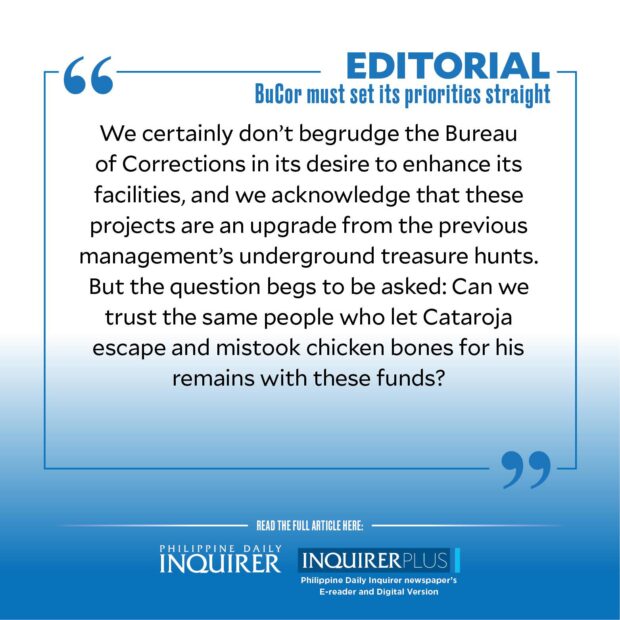BuCor must set its priorities straight
 Michael Cataroja was bored so he sneaked out of the New Bilibid Prison (NBP) in Muntinlupa City on July 7 by crawling under a garbage truck as it left the maximum security compound. At least that was the story the Bilibid prisoner told senators on Tuesday, drawing suspicion because it differed from what he originally disclosed to the police upon his rearrest in mid-August—that he had mingled with visitors and casually walked out.
Michael Cataroja was bored so he sneaked out of the New Bilibid Prison (NBP) in Muntinlupa City on July 7 by crawling under a garbage truck as it left the maximum security compound. At least that was the story the Bilibid prisoner told senators on Tuesday, drawing suspicion because it differed from what he originally disclosed to the police upon his rearrest in mid-August—that he had mingled with visitors and casually walked out.
To lend credibility to Cataroja’s modified version of the events, the Bureau of Corrections (BuCor) released a video of him on Sunday recreating his daring stunt. But it almost seemed as if BuCor was taking pains to paint Cataroja, who was serving time for an anti-fencing conviction and on trial for car theft, as a cunning escape artist for having bolted the Bilibid, because the alternative explanation was too embarrassing to bear: Could an inmate really slip out of the national penitentiary so easily?
There is, of course, a third possibility more in line with BuCor’s unsavory reputation: Did Cataroja get inside help?
None of the above scenarios casts BuCor in a flattering light, but the circumstances suggest, at least, that its officials would rather be viewed as negligent than absurdly inept, or worse, irredeemably corrupt.
Whether Cataroja is telling the truth, and we hope the matter won’t soon be swept under the rug, what this episode shows is BuCor has yet to earn the public’s trust given the proclivities of its past officials and notwithstanding the promised reforms of its new leadership.
Now we hear BuCor pleading with Congress to give it an extra P1.5 billion next year on top of the P7.2 billion earmarked for the bureau in the 2024 National Expenditure Program.
In a statement on Wednesday, BuCor Director General Gregorio Catapang Jr. said his agency needed an additional P812 million for scanner machines, P320 million for advanced body-worn cameras, P155 million for a better surveillance system, P169 million for a new mess hall, and P10 million for more K-9 dogs.
We certainly don’t begrudge BuCor in its desire to enhance its facilities, and we acknowledge that these projects are an upgrade from the previous management’s underground treasure hunts. But the question begs to be asked: Can we trust the same people who let Cataroja escape and mistook chicken bones for his remains with these funds?
Another curiosity is why there was no new request from BuCor to augment its food and medicine budget for over 50,000 persons deprived of liberty (PDLs) across seven penal institutions, including NBP.
During the budget briefing of BuCor’s mother agency, the Department of Justice, Justice Secretary Jesus Crispin Remulla was asked why the proposed P70 daily subsistence allowance and P15 medical allowance for PDLs were unchanged from 2023.
“BuCor asked for P100 for food and P30 for medicine, but our request was denied,” Remulla flatly replied.
In response, Budget Assistant Secretary Mary Ann dela Vega said raising the daily subsidy would entail a corresponding hike for facilities run by the Bureau of Jail Management and Penology. “[The] impact of the increase will amount to almost P3 billion, so the decision … was to maintain that level,” she said.
In the current budget, BuCor was given P1.2 billion for PDLs’ food and medicine, which it hoped to raise to P1.9 billion next year. But in its latest statement, the bureau made no mention of that at all, focusing instead on other items on its wish-list, such as scanner machines, body-worn cameras and K-9 dogs.
Granted these items are important, but must they take priority over preventing hunger in prisons?
Under BuCor’s food subsistence agreements (FSAs) with its caterers, each inmate must have the recommended daily intake of 2,000 calories. But it is hard to imagine, in the face of today’s rocketing prices, how it is remotely possible to convert P70 into three square meals per day.
True enough, in its 2022 audit report on BuCor, the Commission on Audit (COA) flagged several violations of FSAs, noting that inmates at NBP and the Correctional Institute for Women were being served meager and unhealthy meals. Among other findings, COA discovered that PDLs were, at times, receiving just bread and coffee for breakfast, rice and misua patola for lunch, or rice with adobong sitaw for dinner.
This is an outrage. It truly is the height of hypocrisy for a bureau that prides itself in calling its inmates “PDLs”—emphasizing their person rather than their circumstance—to divert more resources toward keeping them behind bars than in good health.
During the Senate hearing, Cataroja claimed it was extreme boredom that drove him to escape in July. But unless BuCor adjusts its misplaced priorities, it won’t take more than the growing prospect of disease or starvation within prison walls to push other inmates to similar acts of desperation. Would anyone be surprised then if the discredited existence of Bilibid mass graves becomes a reality?




















